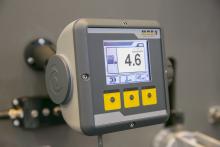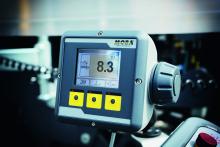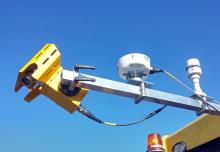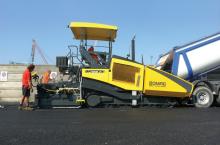German firm
In China the system is now being offered by SANY with its pavers but MOBA admits that it is early days and the package has still to reach the stage that it is recognised for its potential in delivering premium quality paving. Shelstad said that as yet, heat scanning systems have not been written into the specifications as requirements for use in highway (or airport runway) paving jobs in China.
Meanwhile the firm is also offering its Pave-TM thickness measurement package, which can also form part of the BIM process for asphalt paving. This package features sensors that read depth in front of the screed as well as behind the screed, to provide an accurate measurement of mat thickness. Shelstad said, “This is a tool that can optimise you mat thickness.” And he added that with regard to costly wearing course materials, it can help deliver savings for a project.
The ultrasonic sensors are fixed rigidly at the front of the screed and to the rear of the screed. Shelstead added, “But it’s difficult to measure because the screed is floating and you have to incorporate the movement of the screed into the measurements.”
However, he said that the algorithm ensures that the system delivers an accurate measurement. In China the use of such packages has yet to be written into paving specifications also but MOBA believes it has a useful tool that is available now to assist in optimising asphalt paving operations.
Moba’s high technology for asphalt paving
German firm MOBA is keen to develop a market segment for its high technology asphalt paving solutions in China. The firm’s proven heat scanning system is now being utilised in some premier highway and airport runway paving operations in Europe, as it helps identify thermal segregation in the mat that can lead to problems with early wear in the future. According to David Shelstad, vice president for sales and marketing, the system also integrates well with intelligent compaction technologies to ensure mat de









